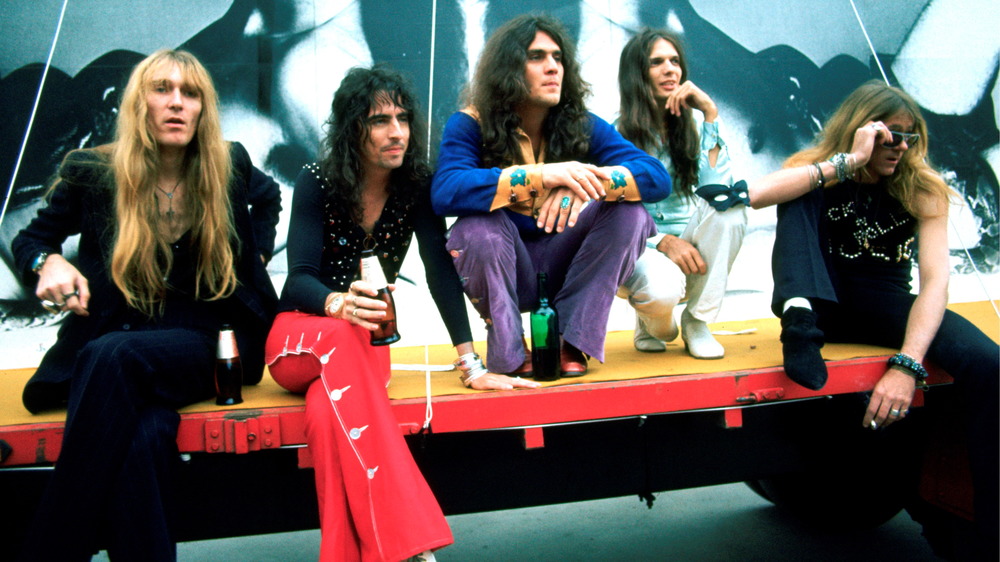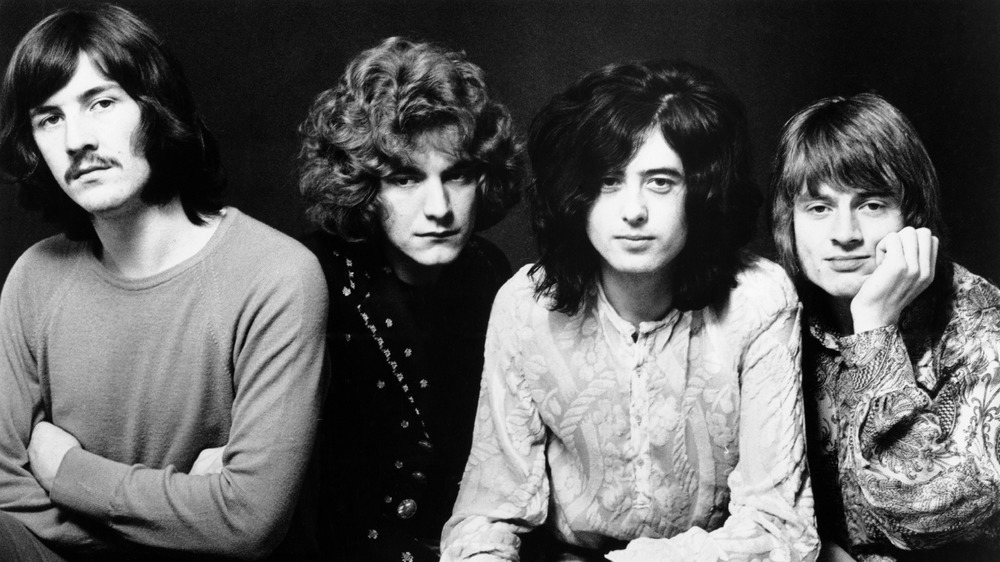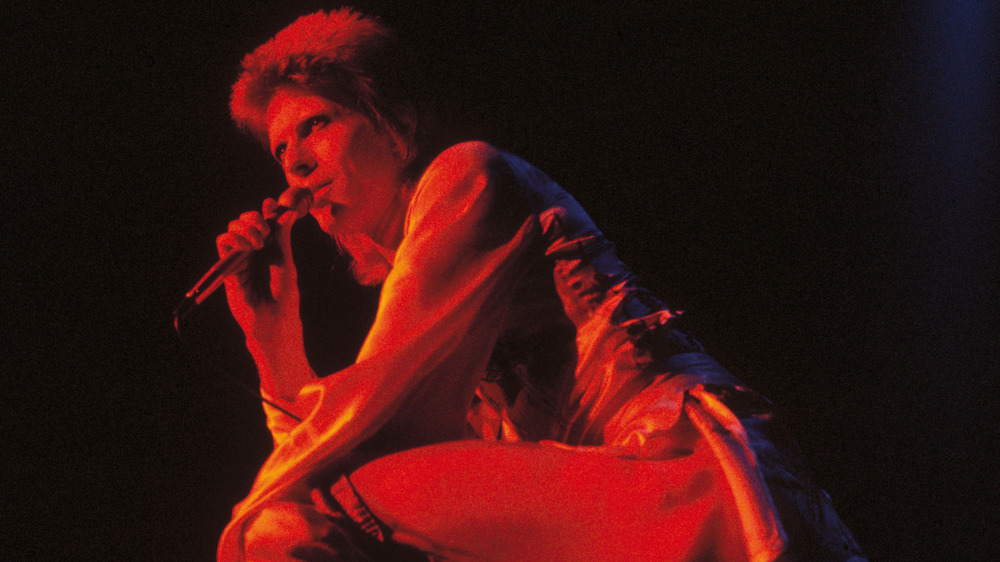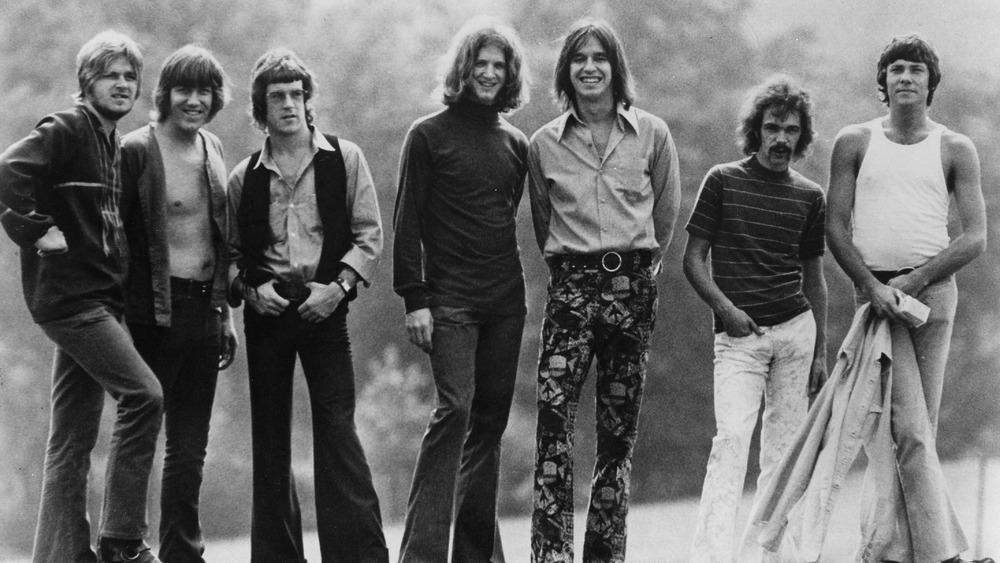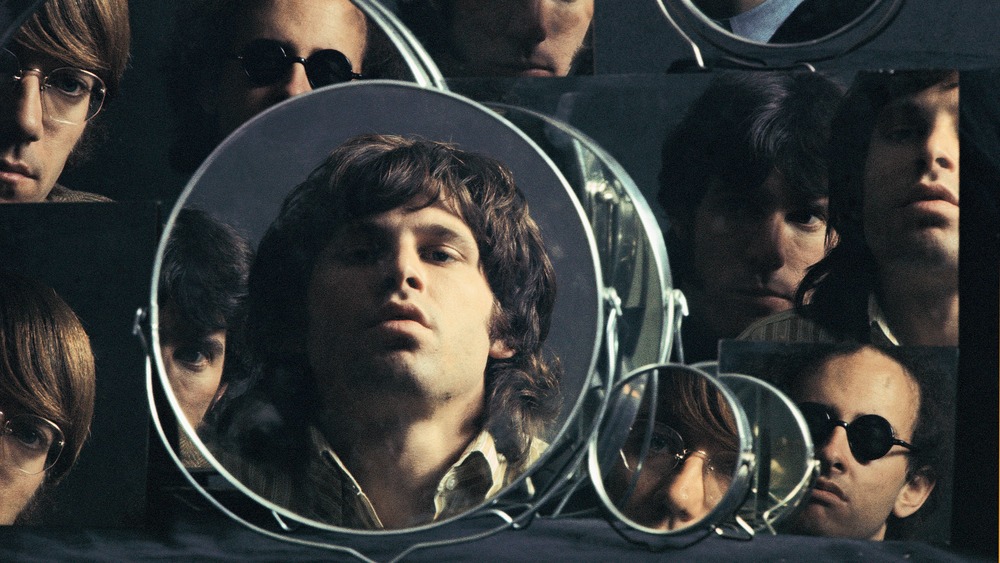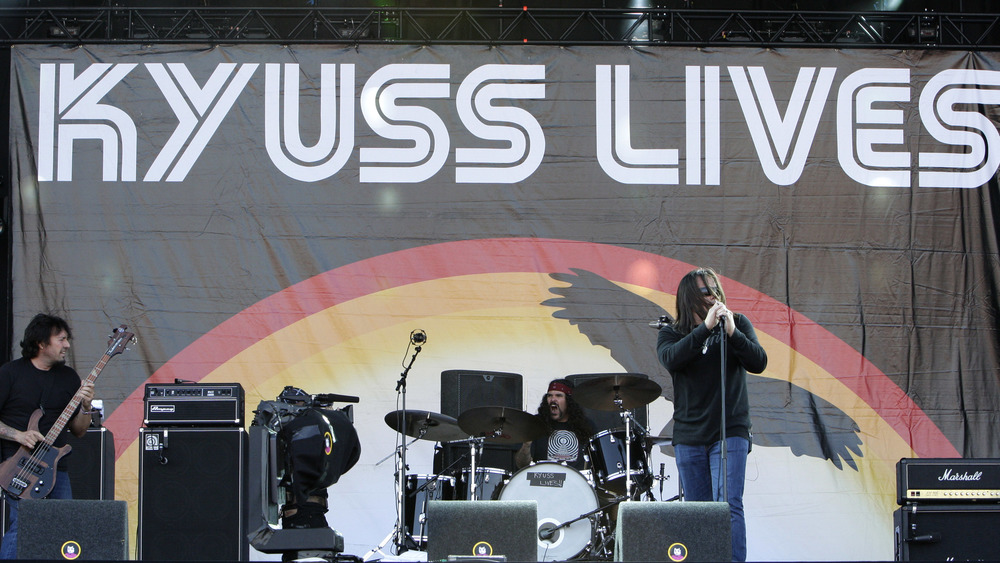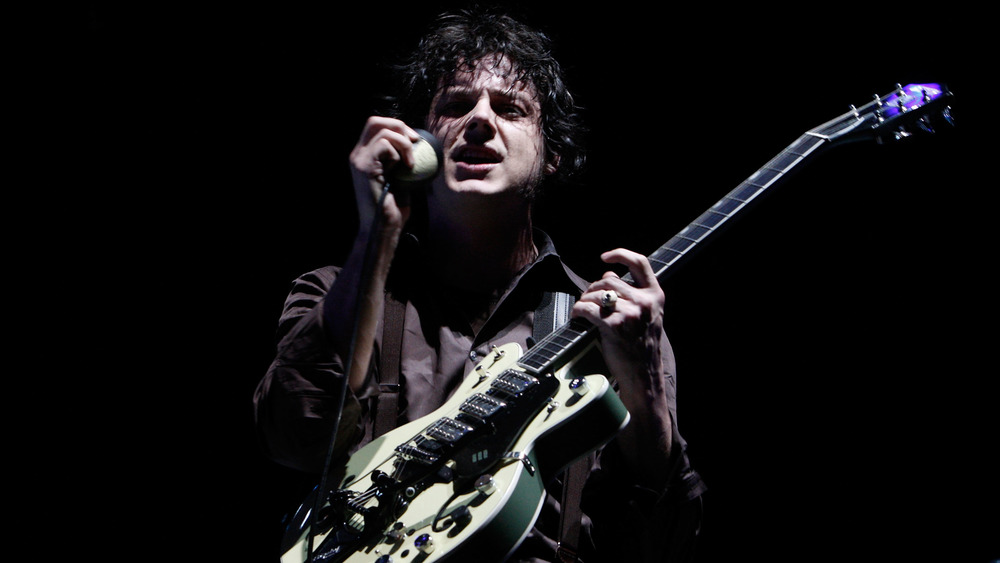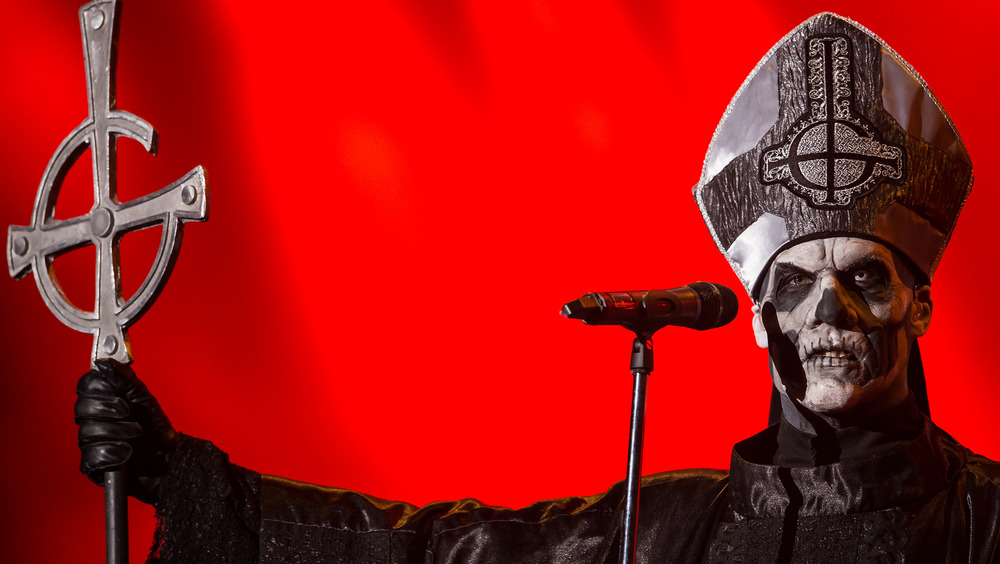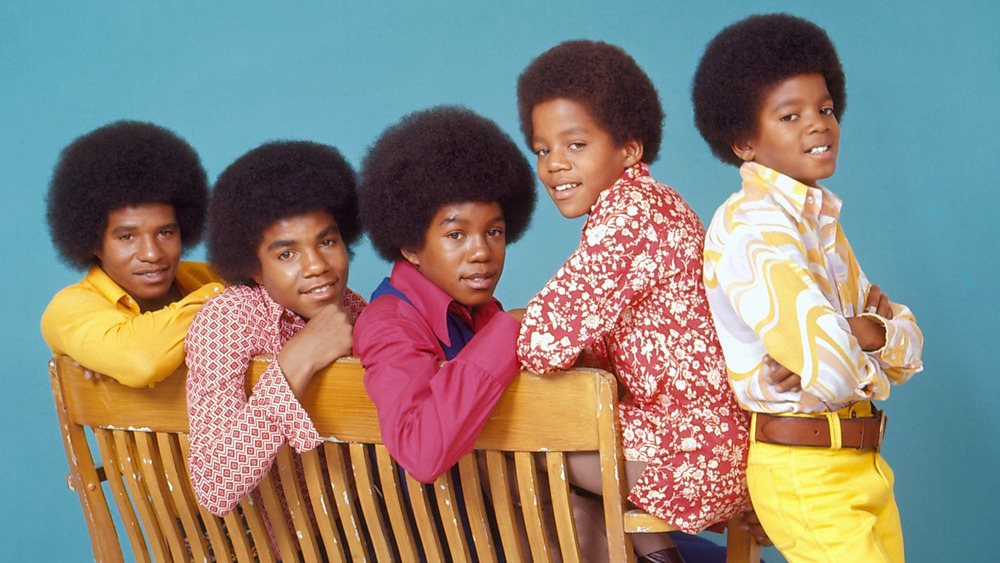The Real Reason These Bands Were Forced To Change Their Names
As any musician will tell you, a name can make or break a band. A good name is often the first step in establishing a group's brand, attitude, and identity. Most of all, a band name should be memorable. Some of the best ones echo a group's style, condensing the mood and tone of the band into a word or two. Take, for example, Led Zeppelin, whose moniker invokes the weight of their thunderous riffs. Legendary Bay area punks the Dead Kennedys' name screams politically and socially charged iconoclasm. And what name could sum up high-voltage rock 'n' roll better than AC/DC?
However, some of the most famous bands of all time have discovered that keeping a great band name can be just as hard as coming up with one. Countless musicians have found out to their frustration that their perfect band name is already being used by another group. Legal pitfalls have also led to name changes. Even long-established groups have had reunions derailed by stubborn former members whose ownership of a band's trademarks have forced a last-minute name change. In the following stories, we're taking a musical journey through the surprising and always frustrating circumstances that have forced bands and musicians to change their names.
Van Halen faced a Mammoth of a name change
Breaking onto the music scene with their self-titled debut album in 1978, Van Halen quickly came to define rock 'n' roll for a new generation. Featuring the outlandish antics of frontman David Lee Roth, the fiery fretwork of guitar hero Eddie Van Halen, the thunderous drums of Alex Van Halen, and the booming bass work and vocal harmonies of Michael Anthony, Van Halen defined both excess and virtuosity with their electrifying stage shows and flawless musicianship. Obviously, it's nearly impossible to imagine such a legendary combination of talents being called anything other than Van Halen. Yet, before settling on the distinctive Dutch surname of brothers Eddie and Alex, Van Halen went through a number of name changes.
According to Ultimate Classic Rock, the seeds of the band that would become Van Halen were sown in 1969, when the brothers formed a cover band cheekily called the Trojan Rubber Company. By 1971, the band had changed its name to Genesis. Still playing covers, Genesis developed a reputation for its raucous live shows. While browsing albums at a local record store, Eddie discovered that the name Genesis was already taken. To avoid confusion with the popular English prog rock band, the struggling rockers went with Mammoth, a name that perfectly reflected their gargantuan sound.
Nevertheless, a cease-and-desist letter from another California band called Mammoth would spur yet another name change. Noting the uniqueness and inherent power of Alex and Eddie's last name, new singer David Lee Roth suggested Van Halen.
How the Nazz became Alice Cooper
Long before Alice Cooper was a solo act, it was the name of the most dangerous band of the early 1970s. Fronted by singer Vincent Furnier, Alice Cooper was a fusion of vaudeville, Grand Guignol, and rock 'n' roll. Beloved by kids and hated by parents, Alice Cooper shattered taboos with their outlandish stage show and climbed the charts with hard-driving rock anthems like "I'm Eighteen" and "School's Out."
Alice Cooper began as a joke band called the Earwigs. Formed by Furnier (better known today as Alice Cooper) and cross-country track teammate Dennis Dunaway as a Beatles parody for a high school talent show, they recruited guitarist Glen Buxton to add a little musical legitimacy to the joke. Having fallen in love with performing, Furnier and company decided to become a real band. Rechristened the Spiders, the group quickly emerged as Phoenix, Arizona's, hottest band. After exhausting the Phoenix scene, they headed for Los Angeles and the big time.
With the classic lineup of Furnier, Glen Buxton, Michael Bruce, Dennis Dunaway, and Neil Smith in place, the Spiders became the Nazz. The Nazz, however, was short-lived. In 1968, Furnier discovered that Philadelphia musician Todd Rundgren and his group were already using the name.
As recounted in Alice Cooper's Golf Monster, Furnier blurted out "Alice Cooper" during a brainstorming session. "I conjured up an image of a little girl with a lollipop in one hand and a butcher knife in the other," Cooper writes. "Lizzy Borden. Alice Cooper. They had a similar ring."
The New Yardbirds and Led Zeppelin
English blues rock band the Yardbirds were one of the most important musical groups of the 1960s. Dedicated to reinterpreting the music of icons such as Sonny Boy Williamson, Howlin' Wolf, and Muddy Waters, the Yardbirds introduced the blues to a new generation.
With the departure of guitarist Eric Clapton, Jeff Beck joined the group, solidifying their eclectic sound. The Yardbirds snagged their third iconic guitarist when Jimmy Page replaced bassist Paul Samwell-Smith. With Chris Dreja on bass, the band enjoyed a brief period that featured the dueling lead guitars of Beck and Page. Beck, however, struck out on his own, and singer Keith Relf and drummer Jim McCarty exited soon after.
Relf and McCarty allowed Page and Dreja to continue as the Yardbirds to fulfill remaining band obligations. Before securing a new lineup, Dreja abruptly quit. Recruiting singer Robert Plant, drummer John Bonham, and bassist John Paul Jones, Page and company took the stage as the New Yardbirds. Despite his initial involvement, Dreja sent Page a cease-and-desist letter forbidding use of the Yardbirds' name.
In an interview with Academy of Achievement, Page explained how Led Zeppelin got its name. "It was a name that Keith Moon had mentioned back then," Page explains. The Who drummer had proposed forming a supergroup which he joked would go down like a lead balloon. "He was talking, 'Wouldn't it be fun to have a band called Led Zeppelin?' And I asked him if we could use the name," Page recalls.
David Bowie lost his name to a Monkee
David Bowie was a true musical original. A chameleon of a performer, Bowie's early career was characterized by his creation of wild personas that defined each album release. From Ziggy Stardust to the Thin White Duke, Bowie never settled for less than pure innovation in both his music and his image. Born David Robert Jones on January 8, 1947, in London's Brixton district, Bowie grew up listening to American rock 'n' roll. Hooked on Elvis and Little Richard, Bowie started his first band, the Kon-Rads, when he was only 16 years old. Frustrated with his bandmates' lack of musical ambition, he left the Kon-Rads. Billing himself as Davie Jones, Bowie drifted between blues bands and recorded several singles that failed to connect with the public.
While struggling to establish himself as an artist in the 1960s, Bowie realized that he had to change his name. As reported by Time, Bowie once explained his motivations to drop his surname in a letter to a fan. "In answer to your questions, my real name is David Jones," Bowie wrote, "and I don't have to tell you why I changed it. 'Nobody's going to make a monkey out of you' said my manager." Of course, Bowie is alluding to Davy Jones, the diminutive and popular singer of the prefab pop group the Monkees.
Before taking the surname "Bowie" from American folk hero Jim Bowie and the knife that bears his name, the late artist nearly co-opted the name of another pop star – Welsh crooner Tom Jones.
Chicago versus the CTA
Before they became a staple of '80s soft rock radio with syrupy top 40 love songs like "Hard to Say I'm Sorry," Chicago was a '70s jazz-rock powerhouse. The band, founded in 1967 by original guitarist Terry Kath, drummer Danny Seraphine, saxophonist Walter Parazaider, trumpet player Lee Loughnane, keyboard player Robert Lamm, and trombonist James Pankow, the group began as a cover band called the Big Thing. Although horns used as an accent in rock music were nothing new, a rock band driven by a brass section was revolutionary. Soon, the Big Thing was concentrating on original music.
With the addition of singer and bassist Peter Cetera in late '67, the Big Thing left the Windy City for Los Angeles. Under the direction of manager and producer Jimmy Guercio, the Big Thing became Chicago Transit Authority. Securing a deal with CBS Records, Chicago Transit Authority released their debut album in 1969.
Bolstered by the hit single "Does Anybody Really Know What Time It Is?" the album sold a million copies. However, Chicago Transit Authority's popularity drew some unwanted legal attention. As recounted in the liner notes of their 2003 compilation The Box, the band ran afoul of the real Chicago Transit Authority. "We heard from the municipal transportation district," says Guercio, "that it was the proprietary property of the city of Chicago transportation department and that if we continued to use the name, they would look at all their legal remedies if we didn't cease and desist."
The Doors' 21st-century problems
Powered by the lyrical vision of poet and singer Jim Morrison, the Doors courted controversy and created counterculture hits, beginning with the 1966 release of their self-titled first album. Five years and six studio albums later, it would all come crashing down when the brilliant but troubled Morrison died under mysterious circumstances on July 3, 1971, at age 27.
Founding members Ray Manzarek, Robbie Krieger, and John Densmore would release two more albums as the Doors following Morrison's death and contribute accompanying music to the posthumous 1978 release of Morrison's spoken-word album, An American Prayer.
In the decades following Morrison's death, the surviving members pursued solo projects and occasionally performed together. However, a proposed 2002 reunion with a new singer drove a wedge between guitarist Robbie Krieger, keyboardist Ray Manzarek, and drummer John Densmore. As reported by Billboard, Manzarek and Krieger attempted to reform the Doors as the Doors of the 21st Century, recruiting Ian Astbury of the British rock band the Cult on vocals and former Police percussionist Stewart Copeland. Founding member Densmore and the estate of Jim Morrison successfully sued Manzarek and Krieger in 2003, blocking them from using the Doors' name. "No disrespect to Ian Astbury or Stewart Copeland," Densmore told Billboard. "They are wonderful musicians. But my point is they are not the Doors."
Renamed Manzarek-Krieger, the musicians eventually reconciled with their former drummer. However, plans for a Doors reunion were thwarted when Manzarek succumbed to cancer in 2013.
Infighting forces a name change for a reunited Kyuss
With their heavy, 1970s-inspired riffs and stripped-down approach, Kyuss were pioneers of the musical style that would come to be known as stoner rock. Founded in Palm Desert, California, by singer John Garcia, guitarist Josh Homme, drummer Brant Bjork, and bassist Nick Oliveri, Kyuss gained a loyal underground following playing "generator parties": beer-fueled outdoor bashes held in the isolated desert communities around Palm Springs in the late 1980s.
Kyuss caught the attention of critics with their acclaimed second release, Blues for a Red Sun. Their next album, 1994's Welcome to Sky Valley, marked the band's pinnacle of success. However, Kyuss' 1995 album ...And the Circus Leaves Town was the beginning of the end. Plagued by lineup changes and internal conflict, Kyuss broke up in the summer of 1995. Nevertheless, members of the band would go on to even greater success, most notably guitarist Josh Homme, who went on to found Queens of the Stone Age and Eagles of Death Metal.
Despite their breakup, Kyuss has maintained a loyal fanbase. In 2011, Garcia, Bjork, and Olivieri began performing as Kyuss Lives! marking the first time the founding members had played together in 19 years. Not down for the reunion, however, were former members Homme and bassist Scott Reeder, who sued over use of the band's name. As reported by Rolling Stone, Garcia and company may tour as Kyuss Lives! but are forbidden to record under the name. The former bandmates now call themselves Vista Chino to avoid further legal entanglements.
The Raconteurs get sabotaged Down Under
Jack White came to fame in the early 2000s as one half of the garage rock duo the White Stripes. Influenced by American blues music and the classic rockers of the 1960s and '70s like Pink Floyd and Led Zeppelin, White carved out a niche for rough-and-ready rock 'n' roll in a musical landscape dominated by pop and hip-hop. After splitting with partner Meg White in 2011, the singer-guitarist embarked on a number of musical ventures, including an appearance in the documentary It Might Get Loud alongside Jimmy Page and U2's Edge. To date, Jack White's most successful non-White Stripes project is the Raconteurs. Founded in 2005, the band features a bluesy, bombastic throwback sound that's equal parts arena rock riffs and garage rock attitude.
The Raconteurs ran into some difficulty Down Under after the release of their 2005 debut album Broken Boy Soldiers. As reported by Beat Magazine, the album's Australian release was delayed when a Queensland jazz band also known as the Raconteurs objected to White's band using the name. Rather than pay the high fee requested for use of the name, White opted to rechristen the band as the Saboteurs for all Australian releases and performances.
Nevertheless, the Raconteurs/Saboteurs hold no ill will toward Australia's Raconteurs. "I think we all just found it amusing," says bassist Jack Lawrence. "We were thinking later we should have asked The Raconteurs to open for us."
Legal troubles bedevil Ghost into an altered name
Shrouded in anonymity for years, Ghost, proclaimed as "metal's strangest band" by music magazine Revolver, is the brainchild of singer Tobias Forge, who dons the vestments of its ever-growing lineage of descendants of "original" vocalist Papa Emeritus. Although the illusion of Ghost as a band composed of "nameless ghouls" presided over by an evil clergyman was shattered by royalty-deprived former members whose lawsuits outed Forge as the band's mastermind, the band remains as popular as ever, nabbing a Grammy for Best Metal Performance in 2015.
In the same year as their Grammy win, Ghost faced a challenge in the US that had nothing to do with their devilish image or lyrics. To the frustration of both fans and the band, the postscript "B.C." (alternately "Because of Copyright" and "Before Christ") was added to their name in 2013 for US performances and album releases for what was described as "legal reasons."
No longer obligated to use the "B.C." suffix, one of the band's nameless ghouls clarified the change to Loudwire in 2016. "The thing was there was never a lawsuit," the ghoul stated. "...Obviously we don't have exclusive rights to our band name because it's a word so commonly used. There are so many brands that have the word "ghost" that I think it's almost un-ownable, in a way, unless it's more specific. So it was basically a demand from the label that we added something."
There's always room for Green Jellÿ
Mixing punk rock, metal, and sophomoric comedy, Green Jellö was formed in Buffalo, New York, in 1981. Conceived by sole original member Bill Manspeaker as "the world's worst band," Green Jellö developed a cult following thanks to their total inability to play their instruments and messy, food fight-inciting live shows.
In 1993, Green Jellö made overtures to the mainstream when their single "The Three Little Pigs" and its accompanying video started to receive airplay on radio and MTV. A comical, faux-metal take on the classic children's story, the song featured thoroughly modern Three Little Pigs facing off against a Harley-riding Big Bad Wolf.
However, as recounted by Kerrang, the single's success also attracted some unwanted attention in the form of a threat of legal action. Citing violation of their trademark for the beloved gelatin dessert Jell-O, Kraft Foods slapped the band with a lawsuit forcing a name change to Green Jellÿ. Still, the band insists that the umlaut over the letter "y" is pronounced as "o."
The extinction of Dinosaur Jr.'s original name
Founded in 1984 by guitarist J Mascis, Dinosaur Jr. would become one of the most influential bands of the '90s' alternative rock boom. Originally called Dinosaur, the band released their first album in 1985. Although their recording debut met with only limited success critically and commercially, the band caught the eye of alternative music darlings Sonic Youth, who invited them along as the opening act on their 1986 tour. Consequently, their second album You're Living All Over Me proved a success in the growing indie rock scene.
According to AllMusic, though, Dinosaur's breakthrough led to an unexpected setback when the group was sued by a short-lived psychedelic jam band supergroup called the Dinosaurs, which was made up of former members of such Summer of Love-era bands as Jefferson Airplane, the Grateful Dead, Hot Tuna, and Country Joe and the Fish. Undaunted, the band added "Jr." to their name, and subsequent pressings of their first two albums were amended to reflect the change.
The Jackson 5 change labels and their name
Michael Jackson may best be remembered as the King of Pop, but before Thriller, Bad, and the endless allegations and rumors that haunted his final years, he was the preteen frontman of the Jackson 5. Signed to Motown in 1970, the group scored a record-breaking four back-to-back number-one singles.
Although classics like "I Want You Back" and "The Love You Save" made truckloads of money for Motown, the Jackson 5 saw little of it. As reported by The New Yorker, the Jackson 5 announced they were leaving Motown for Epic Records in 1975. Attempts to renegotiate with Motown resulted in figures that were termed "Mickey Mouse."
The brothers' departure from Motown would come at price. The Detroit label retained rights to the group's name. Changing their name to the Jacksons, the band made the move to Epic in 1976. Jermaine Jackson, married to Motown founder Berry Gordy's daughter Hazel, stayed with his father-in-law's label.


